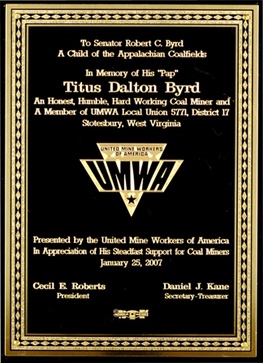|
Note: This post was previously listed under our "News from the Grey Box" blog series By Christopher Taylor  In January 2007, United Mine Workers Local Union #5771 recognized Senator Robert C. Byrd’s “steadfast support for coal miners,” with a plaque in the name of his father, Titus Dalton Byrd, himself a coal miner. From lobbying the President to earmarking federal dollars, Senator Byrd worked hard to improve the lives of West Virginia coal miners and their families throughout his political career. Senator Byrd’s family, like thousands of others in southern West Virginia, lived in a coal company town, Stotesbury. Byrd recalled that the coal company “touched the miners’ lives at every point,” and that its influence was “complete” and “ruthless.” In addition to the mine, the company owned virtually the entire town, from the miners’ houses to the church. Stotesbury’s only store was company run. Miners and their families purchased household goods there with company scrip—tokens which were only redeemable at that store. In those days, dissent was settled by mine guards who administered punishments ranging from evictions to “bloody scenes.” Note: This post was previously listed under our "News from the Grey Box" blog series By Sarah Brennan
Throughout his long career, Senator Robert C. Byrd was known for his vocal support of coal miners and their communities. The senator often argued on behalf of the coal industry in front of Congress, but he also frequently introduced and backed legislation that impacted mining families, such as the Black Lung Benefits Act, clean coal technology, and the Mine Safety and Health Administration. It was in this vein that Byrd came to the aid of the residents of Sundial, West Virginia, a small coal town whose lone elementary school sat perilously below a 2.8 million gallon slurry pond containing the toxic liquid byproduct of cleaning coal, and within a few hundred yards of the Goals Coal processing plant. Slurry contains heavy metals and carcinogens, and in the event of dam failure, it poses a serious flood threat. In addition to the fear of the slurry impoundment failing, the school’s proximity to the processing plant was also an issue. Several Marsh Fork children complained of respiratory problems, and tests taken at the school and the surrounding area showed that the coal dust was negatively impacting the students’ health. Headaches and severe coughing fits were common complaints among the children. |
Welcome to the Byrd Center Blog! We share content here including research from our archival collections, articles from our director, and information on upcoming events.
Categories
All
Archives
July 2023
|
Our Mission: |
The Byrd Center advances representative democracy by promoting a better understanding of the United States Congress and the Constitution through programs and research that engage citizens.
|
Copyright © Robert C. Byrd Center for Congressional History and Education
|

 RSS Feed
RSS Feed
